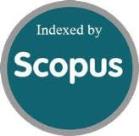Elementary School Teachers’ Conceptions of Teaching Mathematics with Digital Game-based Teaching
Keywords:
self-efficacy, TPACK, digital game based learningAbstract
This study aimed to investigate the factors accounting for mathematics teaching self-efficacy and to examine the relationships among Taiwanese teachers’ mathematics teaching self-efficacy, teaching and learning conceptions, technological–pedagogical content knowledge for the digital learning, and attitudes toward game based learning. A total of 195 math teachers from 23 elementary schools in Taiwan were invited to take part in the study. After ensuring the validity and reliability of each questionnaire, the results indicated that each measure had satisfactory validity and reliability. Furthermore, the results revealed that teaching and learning conceptions, technological pedagogical content knowledge for the digital learning, and attitudes toward game-based learning mediated the relationship between teaching and learning conceptions and mathematics teaching self-efficacy, suggesting that knowledge of and attitudes toward digital game-based learning mediated the positive relationship between constructivist conceptions of teaching and learning and outcome expectancy; however, it mediated the negative correlations between traditional conceptions of teaching and learning and teaching efficacy.
References
R. K. Henson, L. R. Kogan, and V. H. Tammi, “A reliability generalization study of the teacher efficacy scale and related instruments,” Educational and Psychological Measurement, vol. 61, no.3, pp. 404-420, 2001.
I. M. Riggs and L. G. Enochs, “Toward the development of an elementary teacher's science teaching efficacy belief instrument,” Science Education, vol. 74, no. 6, pp. 625-638, 1990.
L. Ramey-Gassert, M. G. Shroyer, and J. R. Staver, “A qualitative study of factors influencing science teaching self‐efficacy of elementary level teachers,” Science Education, vol. 80, no. 3 pp. 283-315, 1996.
A. Bandura, “Self-efficacy: toward a unifying theory of behavioral change,” Psychological Review, vol. 84, no. 2, pp. 191, 1977.
J. McCarthy, J. McCarthy, J. Light, and D. McNaughton, “The effects of internet-based instruction on the social problem solving of young adults who use augmentative and alternative communication,” Augmentative and Alternative Communication, vol. 23, no. 2, pp. 100-112, 2007.
W. Nuffer and J. Duke, “A comparison of live classroom instruction and internet-based lessons for a preparatory training course delivered to 4th year pharmacy students,” Journal of Science Education and Technology, vol. 22, no. 4, pp. 522-528, 2013.
K. W. Chan and R. G. Elliott, “Relational analysis of personal epistemology and conceptions about teaching and learning,” Teaching and Teacher Education, vol. 20, no. 8, pp. 817-831, 2004.
C. Y. Hsu and C. S. Chai, “Exploring preschool teachers’ technological pedagogical content knowledge with educational games,” Workshop Proceedings of the 20th International Conference on Computers in Education, pp. 302-308, November, 2012.
S. Kalyuga and J. Sweller, “Rapid dynamic assessment of expertise to improve the efficiency of adaptive e-learning,” Educational Technology Research and Development, vol. 53, no. 3, pp. 83-93, 2005.
M. L. Connell, “Technology in constructivist mathematics classrooms,” Journal of Computers in Mathematics and Science Teaching, vol. 17, no. 4, pp. 311-338, 1998
Downloads
Published
How to Cite
Issue
Section
License
Submission of a manuscript implies: that the work described has not been published before that it is not under consideration for publication elsewhere; that if and when the manuscript is accepted for publication. Authors can retain copyright of their article with no restrictions. Also, author can post the final, peer-reviewed manuscript version (postprint) to any repository or website.

Since Oct. 01, 2015, PETI will publish new articles with Creative Commons Attribution Non-Commercial License, under The Creative Commons Attribution Non-Commercial 4.0 International (CC BY-NC 4.0) License.
The Creative Commons Attribution Non-Commercial (CC-BY-NC) License permits use, distribution and reproduction in any medium, provided the original work is properly cited and is not used for commercial purposes



